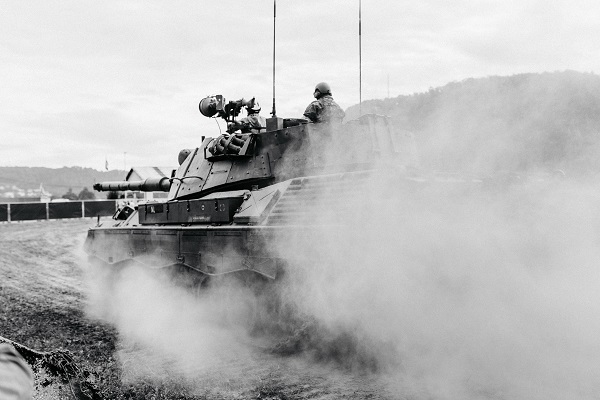In late February of 1991, my reserve infantry battalion invaded Kuwait as part of a 1st Marine Division task force during Operation Desert Storm. Our mission was to liberate that country from the clutches of Saddam Hussein’s Iraqi army.
While Iraqi Scud missiles flew overhead towards coalition targets in Saudi Arabia, our Marines blew through minefields and into burning oil fields where the day was turned into night by actual eco-terrorism as retreating Iraqis set countless drilling rigs ablaze.
(Note: Blowing through those minefields was not all that dangerous, except for the first Marines who cleared the way.)
Our battalion set up a defensive perimeter in the Burgan oil field, where thousands of Iraqis surrendered in a surreal, fiery, and smoky landscape marked by unexploded ordnance. Danger abounded.
As our battalion’s anti-mech officer, I helped position anti-tank positions around our perimeter to guard against rumored Iraqi counterattacks. These attacks never came, but later, with a cease-fire imminent, we were cautioned that Syrian tank formations could be moving through our Area of Operations (AO) and that we should not engage them.
While it may be hard to believe today, those Syrians were our battlefield allies. Because—like the Iraqis—the Syrians used Soviet-made tanks, American commanders feared “friendly fire” incidents that could have huge international implications.
By March 1st the Iraqis capitulated, and our unit soon convoyed through a largely destroyed but joyous Kuwait City—where thousands of Arab Kuwaitis cheered their American liberators in scenes similar to those of World War II when U.S. GIs gave so many European communities their freedom back.
Syrian allies? Arabs lining streets to raucously cheer Americans?
Yes.
That the Syrians remained with us on that battlefield provides important lessons for today.
Because when that 1991 fighting started, Saddam Hussein quickly launched numerous Scud missile attacks on Israel. The intent was obvious. Hussain sought to provoke a military response from Israel that would fracture the fragile international coalition that President George Bush (41) had so skillfully assembled. Were the Israelis to take the bait and fight back, Saddam expected the Saudis, Syrians, and others to at least withdraw from the coalition. His greater hope was that these Arabs would actually join Iraq in a fight against the Zionists. This would utterly disrupt the coalition’s liberation mission.
Israel’s doctrine has always been to forcefully respond to attack. That’s what Hussein counted on.
President Bush and other world leaders pleaded—begged!—Israeli Prime Minister Yitzhak Shamir to not take the bait. Shamir and company thankfully showed the restraint needed so as not to fracture the coalition. Hence, those Syrian tanks remained in our AO, and we then enjoyed that joyous victory ride in Kuwait City.
Those 1991 lessons are so applicable to 2023 and the aftermath of the Hamas terrorist attacks on Israel. The diabolical intent of the Hamas leaders echoes that of Saddam Hussein’s. Provoking Israel into military action that would inevitably result in innocent casualties among the Palestinian populace. The subsequent imagery would be shown ad infinitum and ad nauseam internationally. With the acquiescence of the world’s many anti-Israel elements (including the usual suspects in America), Hamas could then achieve its strategic goals of weakening and isolating Israel, to the detriment of Western geopolitical interests and to the advantage of our mutual adversaries, i.e., Iran, China, Russia, et al.
Emotional responses do not always lead to the best long-term policies. Indeed, many argue that America’s 2003 invasion of Iraq—obviously prompted by the fallout of the 9/11 terror attacks—turned out to be counterproductive, to say the least. But hindsight is 20/20.
Israeli restraint helped us to prevail in 1991. Israeli and Western interests can prevail in 2023 if similar restraint is exercised and if Hamas can ultimately be defeated without the horrors that would accompany an extended bloody invasion of Gaza.
This unfolding situation also affords Americans opportunities to judge the wisdom of aspiring presidential hopefuls while many of us pray that current Israeli Prime Minister Benjamin Netanyahu channels his inner Yitzhak Shamir and doesn’t give Hamas the prize that was denied to Saddam Hussein.
As former Marine and African-American philosopher T.F. Hodge once put it: “The path to peace is not a passive journey. It takes incredible strength not to open a justifiable can of ‘whoop-ass’ when one’s buttons are pushed.”
Truth.
